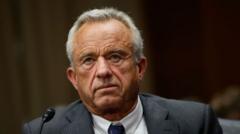**Robert F. Kennedy Jr.'s recent confirmation brings a contentious figure to the helm of U.S. health policy, where he will oversee critical public health agencies amid ongoing debates on vaccine safety and misinformation.**
**RFK Jr. Takes Office as Health and Human Services Secretary Amid Controversy**

**RFK Jr. Takes Office as Health and Human Services Secretary Amid Controversy**
**Despite skepticism, Kennedy will lead federal health agencies as the Biden administration seeks radical reforms.**
Robert F. Kennedy Jr. has officially been sworn in as the next U.S. Secretary of Health and Human Services, a role that places him at the center of one of the most crucial departments in the federal government. His appointment comes amid a backdrop of significant controversy due to his history of being a vocal skeptic of vaccinations and health policies favored by mainstream science. After securing a 52-48 confirmation vote in the Senate, with no Democrats supporting him and only one Republican voting against, Kennedy’s selection reflects a broader agenda of President Donald Trump to rapidly reshape his cabinet.
Kennedy, a known figure in the anti-vaccine movement and founder of Children's Health Defense, faced intense scrutiny during his confirmation hearings. Critics of his appointment have pointed to his past statements questioning the safety and efficacy of vaccinations, particularly childhood immunizations, which have been widely discredited by health experts. Despite his claims of support for rigorous safety testing, his views have raised alarms among lawmakers concerned about the potential impact of misinformation on public health.
Kennedy will now oversee critical agencies such as the CDC, FDA, NIH, and the Centers for Medicare and Medicaid Services, with a workforce of around 80,000 and a budget exceeding one trillion dollars. His confirmation also brings heightened attention to his views on various health topics, including food safety and pharmaceutical manufacturing, sparking further debate among members of Congress.
During his confirmation hearings, Kennedy did not shy away from discussing his views on various health-related issues. He reiterated his stance aimed at improving food safety measures and criticized certain practices within the pharmaceutical industry. However, his conflicted messages around abortion rights led to backlash from Democrats, who accused him of compromising his principles to gain the administration’s support. The emergence of protests during his hearings underscored just how polarizing his views have become.
Prominent voices such as Caroline Kennedy, his cousin, voiced strong opposition to his candidacy, arguing that his history with vaccine skepticism disqualifies him from being a reliable health policymaker. However, some Republicans expressed their backing for Kennedy, emphasizing a need for change in the approach to public health.
As the Senate continues to confirm Trump's cabinet picks, attention will remain fixed on how Kennedy addresses the challenges facing the nation’s health sector. With an extensive agenda ahead, including managing crises and public health initiatives, many are watching to see if Kennedy will effectively bridge the gap between his controversial views and the responsibilities of his high-profile role.




















